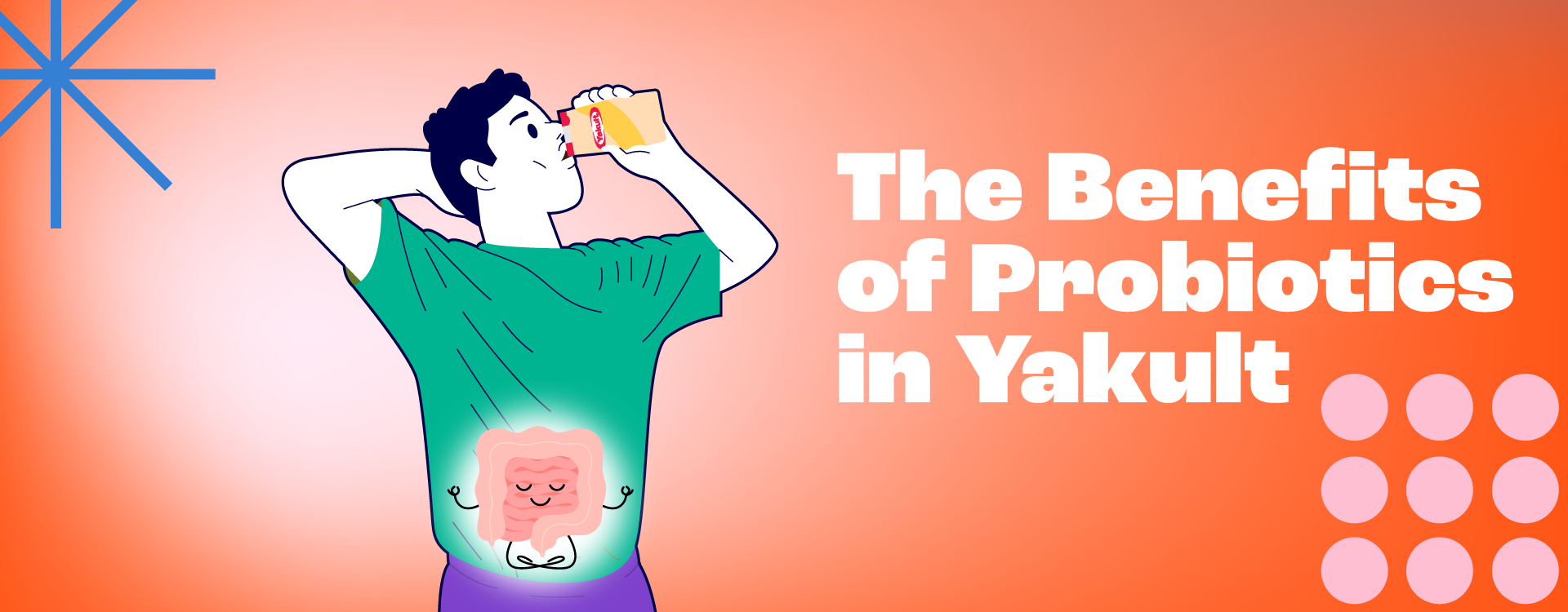

Many people may wonder, why does every bottle of Yakult contain sugar? Some may even think… does it actually have a lot of sugar? Is it true that it’s bad for our health?
But before that, have you ever thought about why Yakult needs sugar in the first place? Let’s find out!
Why is Sugar Added into Yakult?
Let’s uncover the secret behind why sugar is added to Yakult!
1. Balancing the sour taste of lactic acid
The Shirota strain in Yakult produces a large amount of lactic acid during the fermentation process. Naturally, lactic acid is very sour and not pleasant to drink on its own. That’s why sugar is added – to balance out the sourness and make Yakult enjoyable and easy to drink for people of all ages. Without sugar, Yakult would taste too sour for most people, and you might not enjoy it the way you do now.
2. Creating a smooth, consistent texture
While this is not the main factor, sugar also plays a role in contributing to the texture and mouthfeel when drinking Yakult. This helps to make every sip more pleasant and enjoyable! Thus, this makes Yakult more fun to drink!
Did you know? Lactic acid helps prevent the growth of harmful bacteria in the gastrointestinal tract. When the Shirota strain reaches the intestines, it multiplies and produces lactic acid which creates a slightly acidic environment in the gut. This makes it harder for harmful bacteria to grow and multiply.


How Does Sugar in Yakult Affect Health?
Does sugar intake affect our health? Let’s take a look at the risks of consuming sugar in our daily diet.
Sugar Content Per Serving
Yakult Ace contains about 11.2 grams of sugar, while Yakult Ace Light contains 5.0 grams of sugar. That means Yakult Ace Light contains 55% less sugar compared to Yakult Ace. According to the Nutrition Division of the Ministry of Health Malaysia (MOH), the recommended intake of added sugar should not exceed 50 grams or 10 teaspoons per day1. So, having one bottle of Yakult a day is sufficient and within the recommended sugar limit!
Risks of Excessive Sugar Intake
As we all know, excessive sugar intake may lead to various health problems, such as:
- Weight gain
- Increased risk of type 2 diabetes
- Dental issues such as cavities
However, drinking one bottle of Yakult a day is generally still within a safe limit. What matters most is maintaining a healthy, balanced diet along with regular exercise.


The Benefits of Probiotics in Yakult
Did you know that probiotics in general help improve gut function? That’s right! The Shirota strain found in Yakult has been scientifically proven to:
- Help strengthen the gut where 80% of the immunity lies
- Help maintain the balance of the gut flora (intestinal microbiota)
- Help reduce risk of constipation and diarrhea
- Help in reducing toxins in our body2
A study was conducted to observe the effects of Shirota strain consumption on URTI (Upper Respiratory Tract Infection) among healthy middle-aged workers during winter, when incidence of URTI tend to increase. Researchers suggested that maintaining a strong immune system may lower the risk of acute respiratory infections. The results of the study showed that consuming Shirota strain, which is found in each bottle of Yakult, every day for 12 weeks significantly reduced the risk of URTI by supporting a stronger immune system!3
Is Yakult Suitable for Children?
The answer is YES – but in moderation. One bottle of Yakult a day is enough to gain the benefits of the Shirota strain. However, it’s important to remember that children have a lower daily sugar intake limit compared to adults. Parents should take note of the following:
- Monitor your child’s daily food and beverage intake to ensure it does not exceed the recommended daily sugar limit.
- One bottle of Yakult a day is already enough for their needs.
- For children under 1 year old, Yakult can be given in a diluted form of about 1 teaspoon mixed with water.
Parents are encouraged to consult a paediatrician if they have any concerns regarding their child’s diet or overall health.


Yakult Ace Light: Less Sugar, But More Expensive?
For those who want to reduce their sugar intake, Yakult Ace Light is a great alternative due to its lower sugar content (Only 5.0 grams of sugar).
But why is it more expensive even though it has less sugar?!
As explained earlier in this article, sugar is added to Yakult to balance the sour taste of lactic acid. In Yakult Ace Light, stevia and maltitol are used as sugar substitutes to maintain this balance of taste. These two ingredients contribute almost no calories, and only function to enhance flavour. Yakult Ace Light also contains polydextrose, a type of dietary fibre that acts as a prebiotic to support gut function. The addition of these three ingredients makes Yakult Ace Light slightly more expensive compared to Yakult Ace.
Conclusion
Are you still concerned about your sugar intake, or do you simply prefer drinks with less sugar? If so, then Yakult Ace Light is the perfect choice for you!
Yakult is a cultured milk probiotic drink that does contain sugar, but it is added in a controlled amount to balance the natural sourness of lactic acid, creating a pleasant taste that is enjoyable for all ages. When consumed in moderation as part of a balanced diet, the benefits of Yakult’s probiotics far outweigh any concerns about sugar.
Drink smart, enjoy with confidence. One bottle a day for a strong gut!
References
- Mesej Utama Panduan Diet Malaysia 2020. Kementerian Kesihatan Malaysia Bahagian Pemakanan. https://hq.moh.gov.my/nutrition/wp-content/uploads/2023/12/BM_MESEJ-UTAMA-PANDUAN-DIET-MALAYSIA-2020.pdf
- Ujilestari, Tri & Susilaningrum, Dian & Damayanti, Bernita & Saputri, Maulina & Alfian, Rizal. (2021). The Benefit and The Content of Lactic Acid Bacteria “Lactobacillus casei Shirota Strain” in Yakult. Indonesian Journal of Biology Education. 4. 25. 10.31002/ijobe.v4i1.4027
- Shida, K., Sato, T., Iizuka, R., Hoshi, R., Watanabe, O., Igarashi, T., Miyazaki, K., Nanno, M., & Ishikawa, F. (2017). Daily intake of fermented milk with Lactobacillus casei strain Shirota reduces the incidence and duration of upper respiratory tract infections in healthy middle-aged office workers. European journal of nutrition, 56(1), 45–53. https://doi.org/10.1007/s00394-015-1056-1
